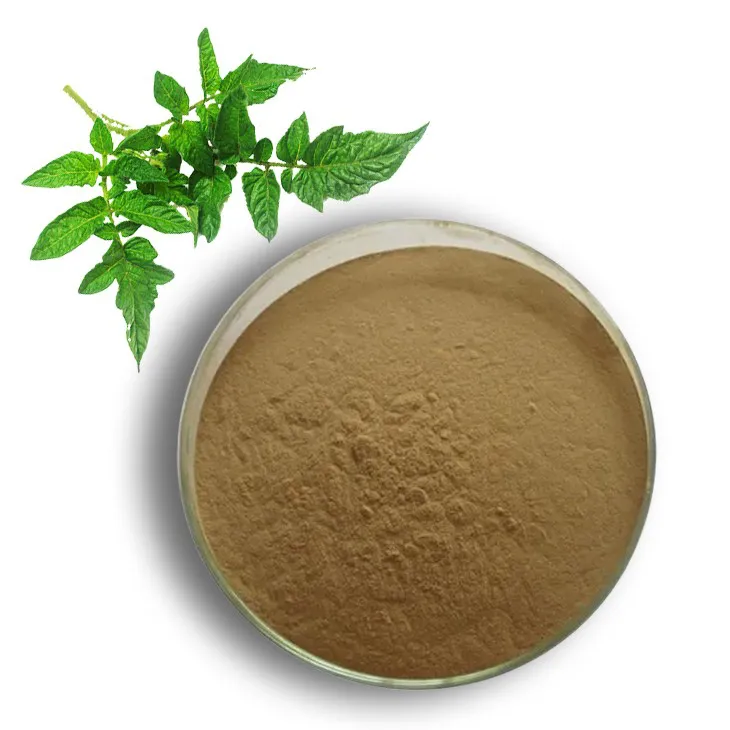- 0086-571-85302990
- sales@greenskybio.com
Five Effects of Senna Leaf Extract + Dosage, Side Effects
2024-11-14

1. Introduction
Senna Leaf Extract has been used for centuries in traditional medicine, particularly for its digestive - related properties. In modern times, it has gained more attention due to its potential health benefits. However, like any herbal supplement, it is important to understand both its positive effects and potential risks.

2. Effects of Senna Leaf Extract
2.1 Laxative Effect
One of the most well - known effects of Senna Leaf Extract is its laxative action. The active compounds in senna, such as sennosides, stimulate the muscles in the colon, which helps to increase peristalsis - the rhythmic contractions that move food through the digestive tract. This is especially beneficial for people who suffer from constipation. By promoting bowel movements, senna leaf extract can relieve the discomfort associated with infrequent or difficult defecation.
2.2 Promotes Bowel Movement Regularity
Regular use of senna leaf extract, when used appropriately, can help to establish a more regular pattern of bowel movements. It works by conditioning the colon muscles over time. For individuals who have irregular bowel habits, this can be a significant improvement to their overall digestive health. It is important to note that this should be part of a holistic approach to digestive health, which may also include a balanced diet rich in fiber, adequate hydration, and regular physical activity.
2.3 Antioxidant Properties
Senna leaf extract may also possess antioxidant properties. Antioxidants are substances that can neutralize free radicals in the body. Free radicals are unstable molecules that can cause damage to cells and are associated with various health problems, including aging and certain diseases. The antioxidant components in senna leaf extract may help to protect the body's cells from this oxidative damage. While more research is needed to fully understand the extent of its antioxidant capabilities, initial studies show promising results.
2.4 Potential Aid in Weight Management
Some believe that senna leaf extract can assist in weight management through its effect on digestion. By promoting regular bowel movements and improving digestion, it may help the body to more efficiently process and eliminate waste. Additionally, a healthy digestive system is thought to play a role in overall metabolism. However, it is important to note that senna leaf extract should not be considered a sole solution for weight loss. It should be used in conjunction with a balanced diet and regular exercise program.
2.5 Detoxification
Another potential effect of senna leaf extract is its role in detoxification. By promoting bowel movements, it helps the body to eliminate toxins that may have accumulated in the digestive tract. This can contribute to a feeling of overall well - being and improved health. However, the concept of "detox" is complex, and while senna leaf extract can play a part in the body's natural elimination processes, it is not a substitute for a healthy lifestyle.

3. Dosage of Senna Leaf Extract
The appropriate dosage of senna leaf extract can vary depending on several factors, including the individual's age, health condition, and the reason for use.
3.1 For Adults
For adults, the typical recommended dosage is between 1 - 2 tablets or capsules (usually containing 15 - 30 mg of sennosides) per day. This dosage is often sufficient to produce a laxative effect without causing excessive side effects. However, it is important to start with the lower end of the dosage range and adjust according to individual response.
3.2 For the Elderly
When it comes to the elderly, a lower dosage may be more appropriate. Due to potential age - related changes in the digestive system and overall health, starting with a half - dose (0.5 - 1 tablet or capsule per day) and carefully monitoring the response is advisable. This is because the elderly may be more sensitive to the effects of senna leaf extract.
3.3 For Children
Children should generally not be given senna leaf extract without medical supervision. In some cases, for older children with severe constipation, a very low dose may be considered, but this should be determined by a healthcare professional. The use of senna leaf extract in children is more restricted due to their developing digestive systems and potential sensitivities.

4. Side Effects of Senna Leaf Extract
While senna leaf extract can have beneficial effects, it also has the potential for side effects, especially when used improperly or in excessive amounts.
4.1 Gastrointestinal Disturbances
One of the most common side effects is gastrointestinal disturbances. This can include abdominal cramps, diarrhea, and nausea. These symptoms are often related to the strong laxative effect of senna leaf extract. If these symptoms occur, it may be necessary to reduce the dosage or discontinue use. Diarrhea in particular can lead to dehydration and electrolyte imbalances if not managed properly.
4.2 Dependency
Long - term and excessive use of senna leaf extract can lead to dependency. The colon may become reliant on the stimulant effect of senna to have normal bowel movements. This can make it difficult for the body to function properly without the supplement over time. To avoid this, it is important to use senna leaf extract only as directed and for short - term periods when necessary.
4.3 Allergic Reactions
Some individuals may experience allergic reactions to senna leaf extract. Symptoms can include skin rashes, itching, swelling, and in severe cases, difficulty breathing. If any signs of an allergic reaction occur, immediate medical attention should be sought. People with a history of allergies to other plants or substances may be at a higher risk of allergic reactions to senna leaf extract.
5. Precautions and Considerations
Before using senna leaf extract, there are several precautions and considerations to keep in mind.
- Pregnancy and Breastfeeding: Senna leaf extract should be avoided during pregnancy and breastfeeding as it can potentially pass through to the fetus or infant and cause adverse effects.
- Existing Medical Conditions: Individuals with certain medical conditions, such as inflammatory bowel disease, intestinal obstruction, or severe abdominal pain, should not use senna leaf extract without consulting a doctor first. The stimulant effect of senna can exacerbate these conditions.
- Drug Interactions: Senna leaf extract may interact with other medications. For example, it can interact with some cardiac medications, anticoagulants, and diuretics. It is important to inform your healthcare provider of all medications you are taking if you plan to use senna leaf extract.
6. Conclusion
Senna leaf extract has several potential benefits, including its laxative effects, promotion of bowel movement regularity, antioxidant properties, potential aid in weight management, and role in detoxification. However, it is crucial to use it at the appropriate dosage and be aware of its side effects. By following proper guidelines and consulting a healthcare professional when necessary, individuals can make informed decisions about whether senna leaf extract is a suitable option for their health needs.
FAQ:
What are the main effects of Senna Leaf Extract?
Senna Leaf Extract has several main effects. Firstly, it has laxative effects, which can effectively relieve constipation and promote regular bowel movements. Secondly, it may possess antioxidant properties, enabling it to combat free radicals in the body. Additionally, it might be beneficial for weight management as it can promote digestion.
How should Senna Leaf Extract be dosed?
The dosage of Senna Leaf Extract can vary depending on factors such as age, health condition, and the purpose of use. However, it is generally recommended to start with a low dose. For adults, a common starting dose might be around 1 - 2 grams per day. It is crucial to consult a healthcare professional before determining the appropriate dosage, especially for those with underlying health issues or those taking other medications.
What are the possible side effects of Senna Leaf Extract?
Some possible side effects of Senna Leaf Extract include abdominal cramps, diarrhea, and nausea. Prolonged or excessive use may lead to electrolyte imbalances, as it can cause excessive fluid loss. In some cases, it may also cause dependence on laxatives for normal bowel movements. If any of these side effects occur or persist, it is advisable to stop using and consult a doctor.
Can Senna Leaf Extract be used for long - term weight management?
While Senna Leaf Extract may assist in digestion and potentially have some impact on weight management in the short - term by promoting bowel movements, it is not recommended for long - term use for this purpose. Long - term use can lead to various side effects and potential health risks, such as the ones mentioned above. For sustainable weight management, a balanced diet and regular exercise are more advisable.
Is Senna Leaf Extract safe for everyone?
No, Senna Leaf Extract is not safe for everyone. People with certain medical conditions such as intestinal obstruction, Crohn's disease, ulcerative colitis, or those who are pregnant or breastfeeding should avoid using it. Also, individuals with a history of electrolyte imbalances or kidney problems should use it with caution. It is always best to consult a healthcare provider before using Senna Leaf Extract.
Related literature
- The Effects and Safety of Senna Leaf Extract in Digestive Health"
- "Senna Leaf Extract: Dosage Considerations and Side - effect Profiles"
- "Antioxidant Properties of Senna Leaf Extract: A Comprehensive Review"
- ▶ Hesperidin
- ▶ Citrus Bioflavonoids
- ▶ Plant Extract
- ▶ lycopene
- ▶ Diosmin
- ▶ Grape seed extract
- ▶ Sea buckthorn Juice Powder
- ▶ Fruit Juice Powder
- ▶ Hops Extract
- ▶ Artichoke Extract
- ▶ Mushroom extract
- ▶ Astaxanthin
- ▶ Green Tea Extract
- ▶ Curcumin
- ▶ Horse Chestnut Extract
- ▶ Other Product
- ▶ Boswellia Serrata Extract
- ▶ Resveratrol
- ▶ Marigold Extract
- ▶ Grape Leaf Extract
- ▶ New Product
- ▶ Aminolevulinic acid
- ▶ Cranberry Extract
- ▶ Red Yeast Rice
- ▶ Red Wine Extract
-
Tinospora cordifolia extract
2024-11-14
-
Garcinia Cambogia Extract
2024-11-14
-
Lycopene
2024-11-14
-
Coix Seed Extract
2024-11-14
-
Citrus Aurantium Extract
2024-11-14
-
Elderberry Extract
2024-11-14
-
Avocado Extract Powder
2024-11-14
-
Bilberry Extract
2024-11-14
-
Buckthorn bark extract
2024-11-14
-
Hawthorn Extract
2024-11-14





















